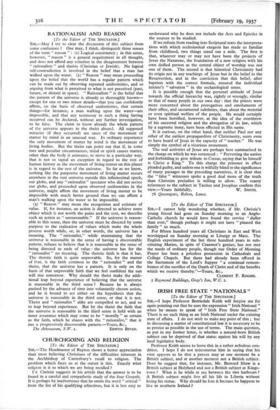RATIONALISM AND REASON
[To the Editor of THE SPECTATOR.] SIR,—May I try to clear the discussion of this subject from some confusions ? One may, I think, distinguish three senses of the term " reason " : (I) Logical consistency ; in this sense, however, " reason " is a general requirement in all thought, and does not afford any criterion in the disagreement between " rationalists" and theists (Christian or Jewish). No logical self-contradiction is involved in the belief that a man has walked upon the water. (2) " Reason " may mean proceeding upon the belief that the world has a regular pattern which can be made out by observing repeated uniformities, and so arguing from what is perceived to what is not perceived (past, future, or distant in space). " Rationalism " is the belief that the pattern of the universe is already so thoroughly known— except for one or two minor details—that you can confidently affirm, on the basis of observed uniformities, that certain things—for instance, a man walking upon the water—are impossible, and that any testimony to such a thing having occurred can be declared, without any further. investigation, to be false. The claim to know already the whole pattern of the universe appears to the theist absurd. All supposed miracles (if they occurred) are cases of the movement of matter by mind in an unusual way. In ordinary experience the only movement of matter by mind is the movement of living bodies. But the theist can point out that if, in some rare and peculiar circumstances, mind or spirit causes matter, other than the body it animates, to move in a particular way, that is not so signal an exception in regard to the rest of human history as the movement of living matter on this planet is in regard to the rest of the universe. So far as we know, nothing like the purposive movement of living matter occurs anywhere in the vast universe outside this infinitesimal speck, our globe, and any "rationalist" spectator who did not notice our globe, and proceeded upon observed uniformities in the universe, might affirm the movement of living matter to be impossible with much better ground than we can affirm a man's walking upon the water to be impossible.
(3) " Reason " may mean the recognition and estimate of value. If, for instance, an action is directed to achieve some object which is not worth the pains and the cost, we describe such an action as "unreasonable." If the universe is reason- able in this sense, then the universe must be directed by some purpose to the realisation of• values which make the whole process worth while, or, in other words, the universe has a meaning. The "rationalist," while maintaining that the universe is reasonable in the sense of having a discoverable pattern, refuses to believe that it is reasonable in the sense of being directed to ends of value : the universe has for the " rationalist " no meaning. The theistic faith is that it has. The theistic faith is quite unprovable. So, for the matter of that, is the faith common to the " rationalist " and the theist, that the• universe has a pattern. It is only on the basis of that unprovable faith that we feel confident the sun will rise tomorrow. Why should the theist make the addi- tional leap beyond experience of believing that the universe is reasonable in the third sense ? Because he is always pushed by the advance of time into voluntarily chosen action, and he is bound to act either on the hypothesis that the universe is reasonable in the third sense, or that it is not. Theist and " rationalist " alike are compelled to act, and so to leap beyond experience. But by the theist the faith that the universe is reasonable in the third sense is held with an inner assurance which may come to be " morally " as certain as the faith, which he shares with the "rationalist," that it has a progressively discoverable pattern.—Yours, &c.,














































 Previous page
Previous page